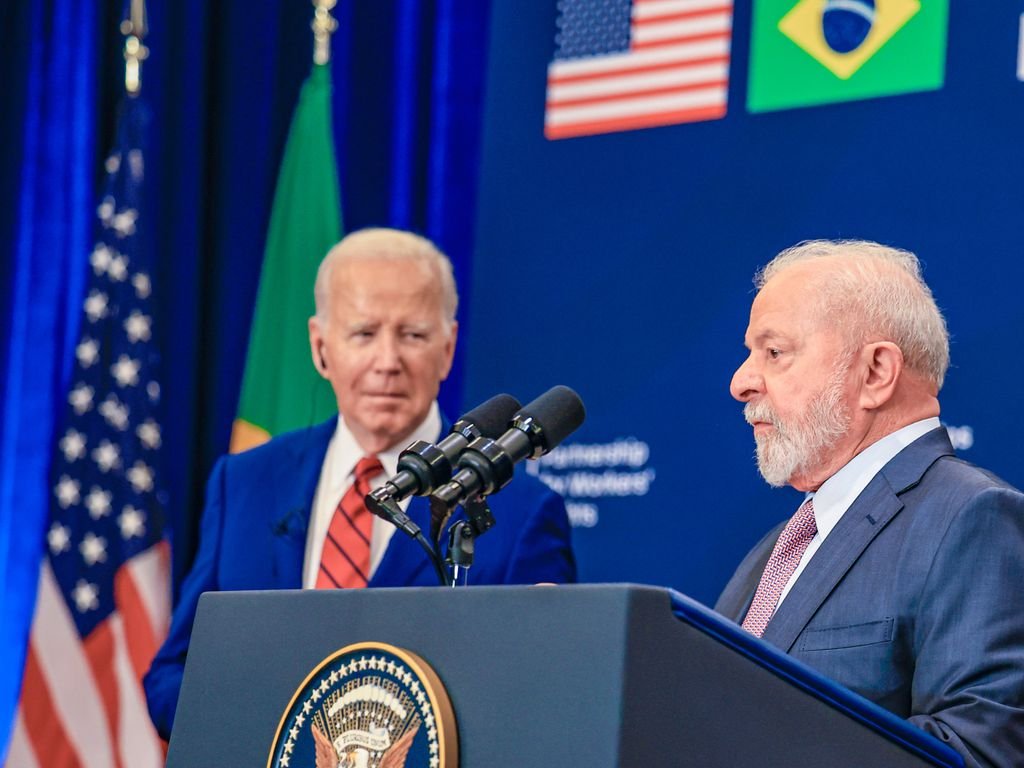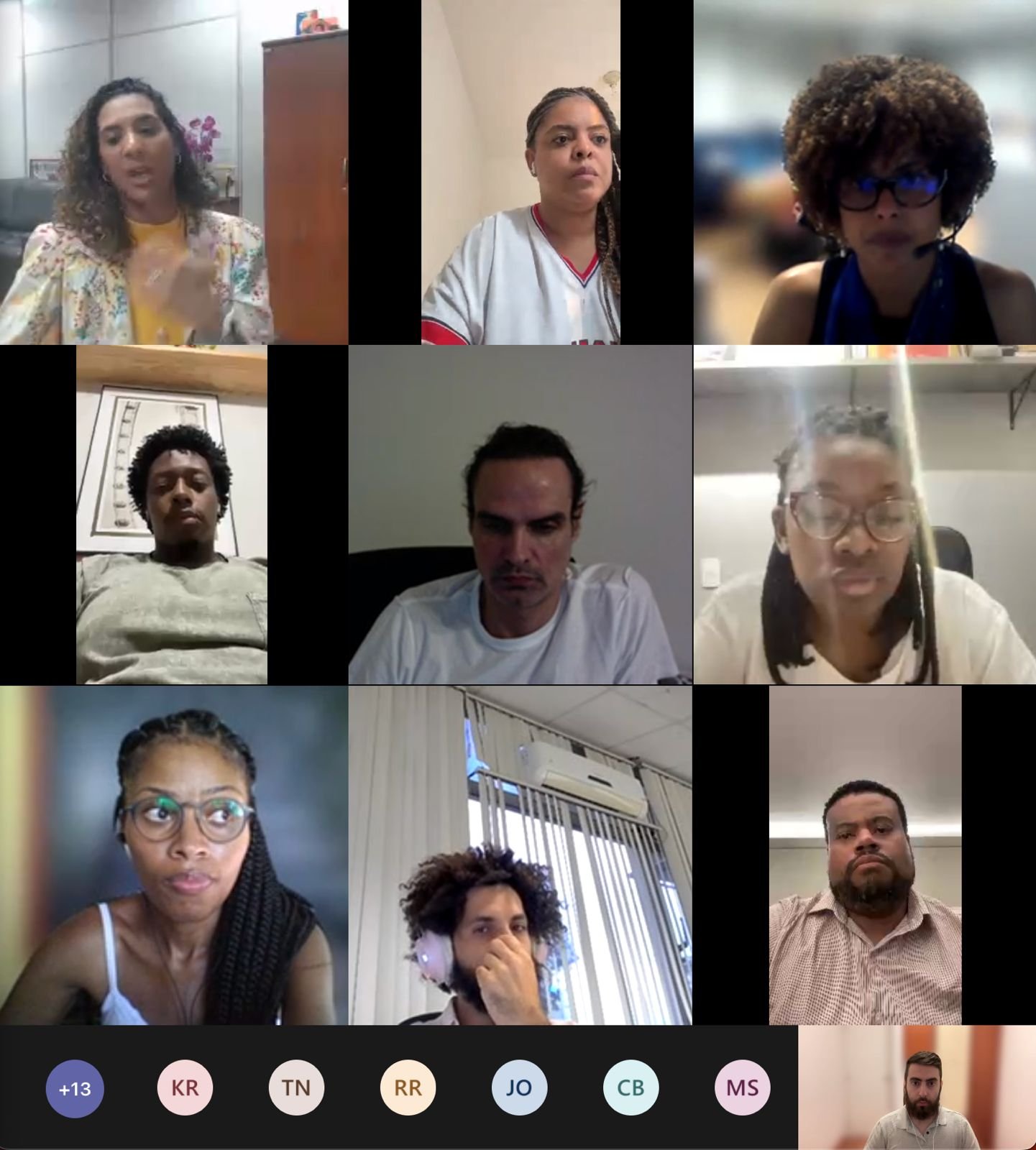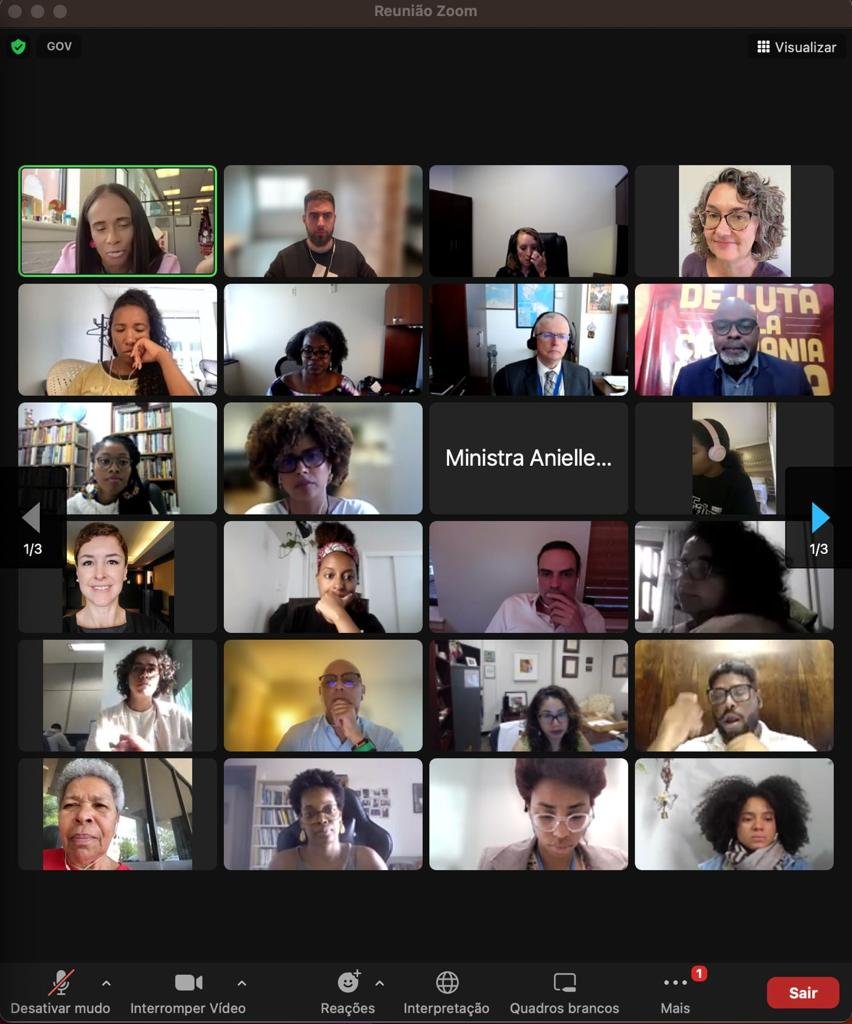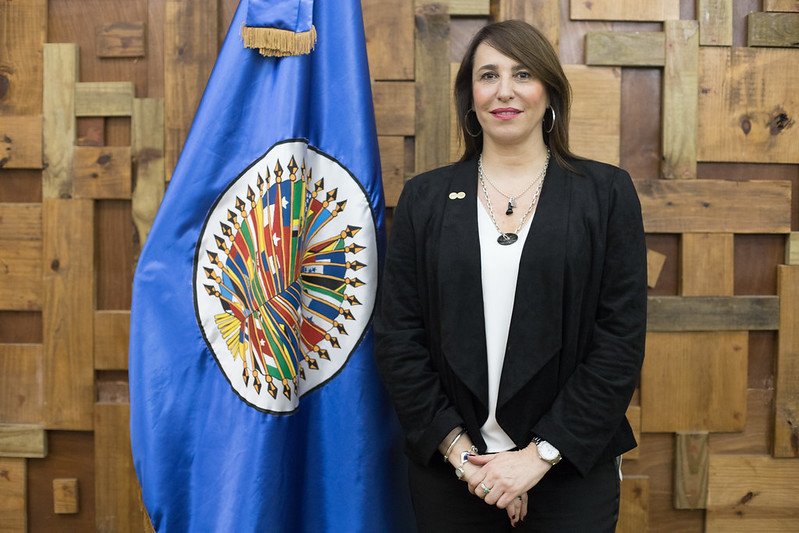International Articulation of Brazilian Black Movements Advances and Prioritizes JAPER
WBO Press release
November 1st 2023
Group of 14 Black organizations dialogues with governments in Brazil and the United States in favor of greater participation of civil society in international bodies
Joint actions at the UN, the OAS, the US State Department; US and Brazilian presidents highlight JAPER as one of their priorities
The Washington Brazil Office (WBO) supports the international articulation of Black movements in Brazil. In December 2022, it created a Working Group (WG) on Racial Justice, which today is made up of 14 organizations related to Brazilian Black movements, in order to support and expand participation of organized civil society in actions related to the issue of racial justice in Brazil and the United States. The group maintains dialogues with the governments of Brazil and the United States, the U.S. Congress, the Organization of American States (OAS), the United Nations (UN) and American civil society.
The Working Group has an approach based on active listening to the demands of affiliated Black movement organizations, resulting in the elaboration of a work plan formulated directly by the Brazilian civil society organizations that make up the Working Group and whose content reflects their international agendas.
“The WBO’s entire effort is to support and contribute to the growing protagonism and active voice of Black movement organizations themselves, which are very powerful, not only within Brazil, but also in international bodies. The Brazilian Black movement has a great international role to play. It has a lot to say and share with the international community. It is a privilege for the WBO to be able to serve as a support and organizational structure for this direct international work of the Black movement”
In eleven months of joint action, the Working Group on Racial Justice managed to promote a series of initiatives linked to the interrelationship among the governments of Brazil and the United States, multilateral organizations, and academia. Among these actions is the central role of the advocacy carried out by the WG for the reactivation of JAPER – the acronym in English of the Joint Brazil-United States Action Plan for the Elimination of Ethnic-Racial Discrimination and the Reduction of Inequality. This advocacy resulted in the US and Brazilian governments resuming the plan and promise to give more space and greater weight to civil society organizations in the design and implementation of their joint policies for the sector.
The Resumption of JAPER
n December 2022, the WBO met with CEERT - Center for the Study of Labor Relations and Inequalities, an organization that worked on JAPER negotiations in its first phase of implementation (2008-2011). At the meeting, CEERT proposed that the resumption of the agreement be a focus of advocacy for the year 2023. The topic was taken to the meeting of the Working Group on Racial Justice in January 2023.
After the Working Group's deliberation on the centrality of social articulation around JAPER, the first action taken by the group was to send a letter on February 8 to Presidents Joe Biden and Luiz Inácio Lula da Silva, in which the organizations demanded the effective implementation of the binational agreement that had been signed in 2008 during the Lula da Silva and George W. Bush administrations. The group, which at the time was made up of only 10 of the 14 current organizations, also asked that the implementation of the agreement be carried out with the effective participation of civil society in both countries, and not be limited only to government actions.
“Cooperation between the two countries in combating racism and promoting racial equity is essential. JAPER is a platform that can drive important actions in this arena as long as Black organizations are central to any negotiations”
One of the results of the meeting between Presidents Lula and Biden in Washington in February of this year was the announcement of the resumption of JAPER, as requested in the letter sent to both presidents on the eve of the meeting between the two leaders.
Presidents of the USA, Joe Biden, and Brazil, Luiz Inácio Lula da Silva, in a meeting in Washington
Three months later, on May 12, the Working Group, now expanded to 13 of the current 14 organizations, was invited to a meeting with the Ministry of Racial Equality to receive updates on intergovernmental negotiations regarding the agreement, and also to discuss the next steps for the implementation of JAPER. At that time, Black movement organizations presented the WBO to the government of Brazil as an organization supporting the articulation of Brazilian Black movements within the scope of JAPER.
Meeting of the Working Group on Racial Justice with the Minister of Racial Equality, Anielle Franco, on May 22, 2023
In response to the meeting, the 13 organizations in the Working Group sent a letter to Minister Anielle Franco reiterating the request for broad civil society participation in the JAPER negotiation processes, both domestically and internationally. This communication resulted in a meeting with the Minister of Racial Equality Anielle Franco on May 22, when the Brazilian government's commitment to the participation of civil society in the design and implementation of JAPER was assured. This commitment was reaffirmed by the minister at the official launch meeting of the agreement held on May 23 in Brasília.
On July 18, the governments of Brazil and the United States promoted a broad meeting on JAPER involving the participation of government and civil society representatives from both countries. On the occasion, the Working Group presented to the two governments a new letter to the Minister of Racial Equality Anielle Franco and the US Special Representative for Racial Equity and Justice Desireé Cormier-Smith with a detailed position on the demands of civil society to the Brazilian government on the topics previously agreed upon by the two governments within the scope of JAPER. The six-page document highlighted the need for greater robustness in the proposals agreed to so far, as well as topics considered essential for Brazilian civil society. Despite not having received an answer from the US government counterpart, Minister Anielle Franco gave a positive response to the group, reinforcing the desire to include Brazilian civil society, as well as the interest in covering almost all of the points listed by the movements in the negotiations on the agreement.
Meeting of Brazilian civil society organizations and American civil society with representatives of the governments of Brazil and the USA about JAPER, on July 18, 2023
In August, the WBO Working Group on Racial Justice met again with the government of Brazil to discuss the creation of a technical working group that would formalize negotiations about JAPER on the Brazilian side to be established by order of the Ministry of Racial Equality. The Working Group nominated two of its organizations to participate in the Ministry's initiative – the Center for the Study of Labor Relations and Inequalities (CEERT) and Coletivo de Entidades Negras (CEN), reinforcing the Working Group's position as a coordination center for Brazilian civil society on the subject. Furthermore, representatives participated in thematic meetings promoted by both countries to discuss JAPER's Education and Health pillars, that were held virtually on the September 11 and 12, 2023.
During this period, the Washington Brazil Office also sought to carry out bilateral coordination with the United States government on JAPER by meeting with the United States Embassy in Brasília; the State Department's Office on Brazil and the Southern Cone (BSC); the Office of Policy Planning; the U.S. Department of State's Office of Democracy, Human Rights, and Labor (DRL); and the Office of the Special Representative on Racial Equity and Justice.
The Brazilian Black Movements Articulation Working Group at JAPER continues to advance. In addition to following up on contacts with the Brazilian government, a request was sent for a virtual meeting between the organizations of the WBO Working Group and the US Department of State to formally introduce Brazilian social movements’ articulation regarding JAPER. Finally, the WBO is also coordinating, together with US partners, the trip in December 2023 of representatives from the GT organizations for a face-to-face meeting in the United States with representatives of American civil society and the US government in order to discuss JAPER.
Beyond JAPER
The articulation to reactivate JAPER and to increase civil society participation in the binational agreement is just one of the international activities that the WBO has developed alongside Black movement organizations.
On March 10, a group of seven Brazilian and foreign organizations promoted in New York a “side event” (category of “parallel event”) to the UN Commission on the Status of Women entitled “The Movements of Brazilian Black Women and their Contributions to the Global Anti-racist Struggle”.
Soledad García Muñoz, Special Rapporteur on Economic, Social, Cultural and Environmental Rights of the Inter-American Commission on Human Rights (IACHR)
On May 30, 11 organizations from the Brazilian Working Group on Racial Justice presented a letter at the UN Permanent Forum of People of African Descent, held in New York, in which they defended the adoption of a racial reparations agenda that has a Brazilian perspective. Among several points contained in the letter, the group requested that the next session of the Forum take place in Brazil. This UN body was created in 2021, had its first meetings in 2022 in Geneva, and the second set of meetings in 2023 in New York.
On another front, the WBO co-organized the visit to the United States of a delegation made up of 14 Black movement organizations, which, between May 29 and July 8 was in Washington and New York to expand international cooperation and strengthen the fight against impunity in cases of racial violence in Brazil. The organizations, which are part of the Black Alliance for the End of Violence, with support from the Elas+ Fund, were received, among other interlocutors, by the Office of Western Hemisphere Affairs of the US Department of State, by the Brazilian Mission to the Organization of American States (OAS), the Inter-American Commission on Human Rights (IACHR), and the Congressional Black Caucus, a group that, since 1969, has brought together members of the U.S. Congress of African descent.
Dialogues with the Inter-American Commission on Human Rights (IACHR) took place through meetings with the thematic rapporteurs on the Rights of People of African Descent and against Racial Discrimination and on Economic, Social, Cultural and Environmental Rights (REDESCA), which resulted in the visit to Brazil by the then head of REDESCA, Soledad García Muñoz, who, between the June 11 and 17, was in São Paulo, Brasília, Salvador and Rio de Janeiro. The visit resulted in the presentation of a final report on the situation of human rights in Brazil, in which issues of racial justice are present.
Meeting of the Working Group on Racial Justice with the thematic rapporteurs on the Rights of People of African Descent and against Racial Discrimination and on Economic, Social, Cultural and Environmental Rights (REDESCA) of the IACHR (Inter-American Commission on Human Rights)
In September, the WBO had the opportunity to support the organization of a 15-day trip to Washington and New York led by representatives from LabJaca, an entity belonging to the National Favela Conference, an affiliated organization and member of the WBO WG on Racial Justice. Lab Jaca's intention is to internationalize and strengthen the agenda of Brazilian movements on the periphery, which is now becoming one of the WBO's new areas of technical support and action. LabJaca members attended meetings, seminars, receptions and other activities organized directly or by partners. The agenda coincided with the 78th Session of the United Nations General Assembly. Most of the events were related to the relationship between environmental protection measures and the peripheries – which are those that suffer most, worldwide, from the effects of climate change.
The WBO has also supported the dialogue of Black movements with UNESCO for greater social participation in the Global Forum against Discrimination and Racism, whose 2023 sessions will take place in São Paulo between November 29 and December 1. Another relevant topic under discussion is the possible invitation for some of the organizations to participate in the event called the Global Racial Justice Roundtable, which will take place in Rio de Janeiro from December 5 to 7 promoted by the Global Initiative for Justice, Truth and Reconciliation, a partner organization of Coalition of Sites of Conscience (ICSC) and Centre for the Study of Violence and Reconciliation (CSVR).
Next steps in supporting International Actions
The coming months promise an intensification of the technical support given by the WBO to Brazilian Black movements for their international agenda. In December, the organization will promote a face-to-face meeting of the organizations of its GT on Racial Justice to evaluate the next stages of articulation of the Working Group, which include continued support for all the agendas that were part of the 2023 work, implementation of the next action steps of JAPER, and the expansion into hitherto unexplored forums.
The following organizations make up the WBO Racial Justice Working Group:
Center for the Study of Labor Relations and Inequalities (CEERT)
National Coordination of Quilombos Coordination (CONAQ)
Collective of Black Entities (CEN)
Agbara Fund
Geledés - Black Women's Institute
Peregum Black Reference Institute
Maria and João Aleixo Institute (IMJA)
Marielle Franco Institute
Steve Biko Cultural Institute (ICSB)
Data and narrative laboratory about favelas (LabJaca)
NZinga Black Women's Collective
Observatory of Whiteness
ODARA – Black Women’s Institute
UNEAFRO Brazil






